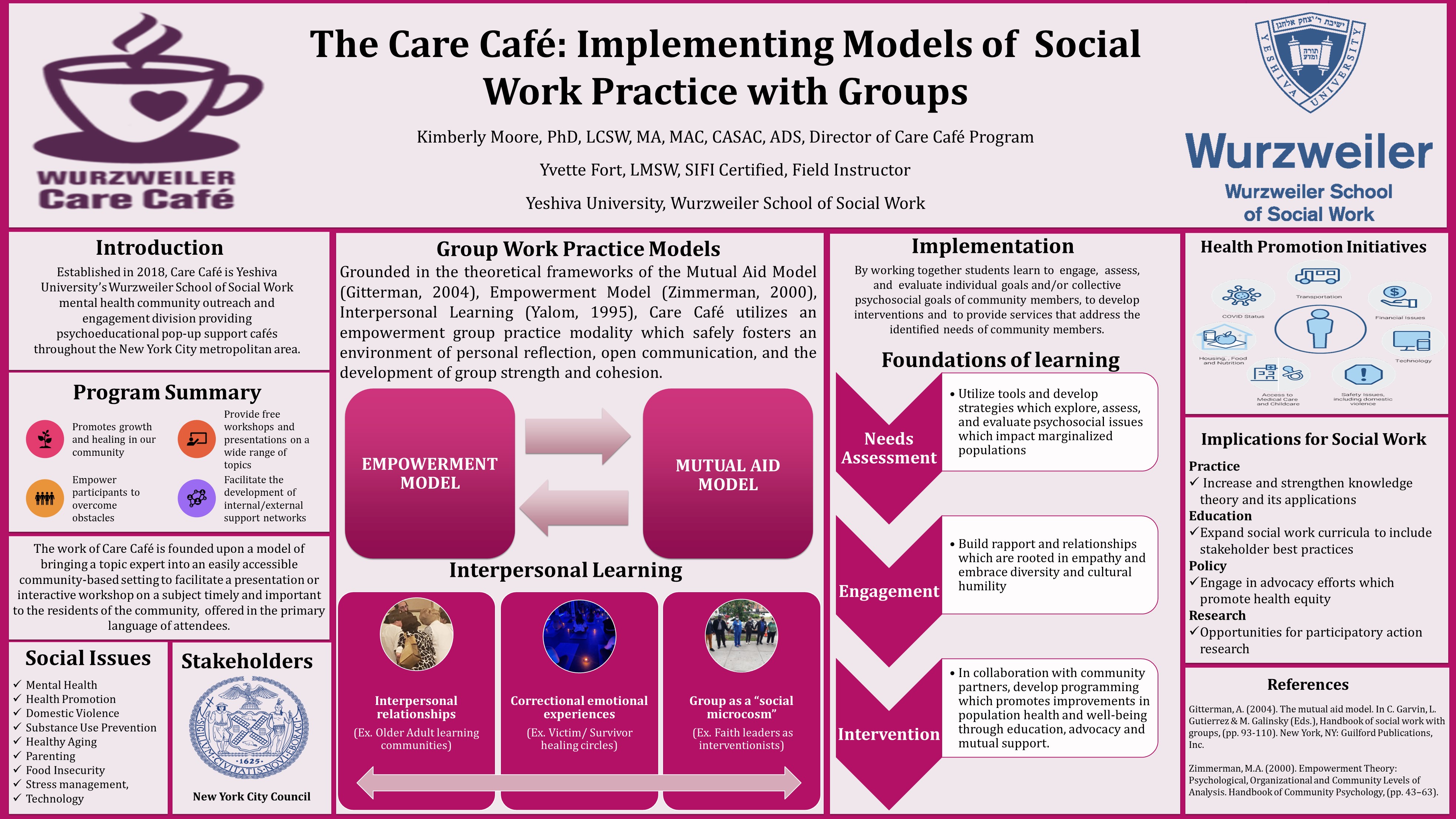The Care Cafe: Implementing Models of Social Work Practice with Groups
Kimberly Moore, Yeshiva University, New York, NY (USA)
Yvette Fort, Yeshiva University, New York, NY (USA)
This poster presentation will highlight the services provided through a community-based model of connecting health promotion topic experts into easily accessible community-based settings.
View Poster PDF |
Presentation Description:
The work of this program is founded upon a model of bringing a topic expert into an easily accessible community-based setting and providing a presentation or interactive workshop on a subject timely, and important, to the residents of a community offered in the primary language of attendees. The program focuses on addressing the mental health needs of vulnerable and marginalized populations across the boroughs of New York City. Furthermore, the program has provided specialized programming for Veterans, Older Adults, and Holocaust Survivors. MSW and PhD students co-facilitate and design programming. Since its inception, the program has partnered with a variety of community-based organizations and faith-based settings to provide a wide range of services, up to and including, psycho-education seminars, program design and technical assistance, advocacy support, and most importantly, emotional support for our service provider partners. Topics include issues related to stress management, wellness, suicide prevention, addiction and mental health, domestic violence, healthy aging, parenting, technology, and education.
Schools of social work are well poised to support the needs of their neighboring communities by leveraging their networks and resources to promote social justice (McBeath & Austin, 2021, p. 224). This program is deeply embedded in social work curricula, harnessing skills learned across individuals, children and families, groups, and community organizing. This program is designed to promote a culturally sensitive healing space emphasizing the importance of developing and strengthening human relationships, leaving clients feeling revitalized and promoting overall well-being (Gutierrez & Lewis, 2022, p.206; NASW, 2021). Utilizing this framework and the power of human connection, this program empowers communities and enhances service delivery in various community-based settings from a client centered approach. Our program thrives on feedback received from the community members we serve. Between July 2021 and June 2022, the program has served over 400 people across New York City. The following are a few comments and testimonials provided by participants who attended recent events. When asked the question, what was the best part of today’s event, participants expressed: “Sharing about our life”; “The connections and group work”; “Learning how to step up!”; “Getting real advice and feedback on how to properly plan”; “If it wasn’t for you, I would have lost everything.”; “All of it!” By attending this poster presentation, participants will take a deeper dive with us as we describe lessons learned and strategies to advance our efforts to support improved community wellness.
Participants attending the poster presentation will achieve the following learning objectives:
- Through providing an overview of the program, participants will learn about key aspects of the model as an effective, sustainable community engagement strategy and advocate for equity.
- Describe the intersectionality of power, race, class, and gender in community practice.
- Specify the ways in which the development of strong therapeutic alliances between community-based organizations and academic institutions can advance improvements in population health.
- Describe the benefits of a community outreach and engagement division extension through the academic institutions and critical learning objectives which can be achieved for students seeking advancement in community practice.
References:
- Gutierrez, L.M. & Lewis, A. E. (2022). Education, participation, and capacity building in community organizing with women of color. In M. M. Editor & W. P. Editor (4th ed.), Community organizing and community building for health and social equity (pp. 205-219). Rutgers University Press.
- McBeath, B. & Austin, M. J. (2021). Redesigning schools of social work into schools of social work and social justice: Opportunities for civic and organizational renewal in a justice reform environment. Journal of Social Work Education, 57(1), 224-237. https://doi.org/10.1080/10437797.2021.1912677
- National Association of Social Workers. (2021). Highlighted revisions to the code of ethics. National Association of Social Workers.

